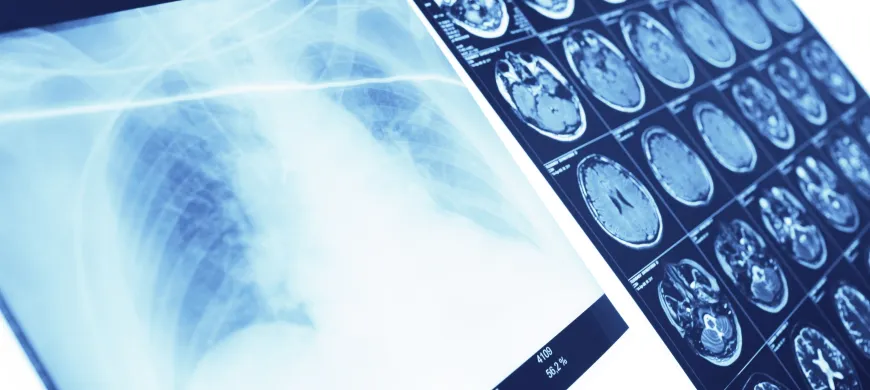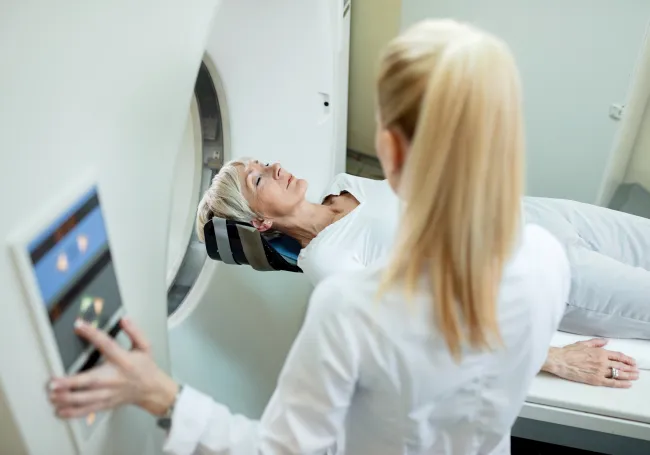Lung Cancer Screening
Diagnostic Imaging Services

Lung cancer is the leading cause of cancer deaths in both men and women in the United States.
Lung cancer screening is a safe, painless process used to detect the presence of early-stage lung cancer in otherwise healthy people with a high risk of lung cancer
Decrease the Risk
A recent nationwide trial showed low-dose spiral computed tomography (LDCT) scans are better than chest x-rays at finding early-stage lung cancer. Screening with LDCT decreases the risk of dying from lung cancer.
If you're a current or former smoker and between the ages of 55 to 77, you may benefit from a screening offered through Summit's Diagnostic Centers that is covered by Medicare at 100 percent. Private insurance covers lung screening for smokers 100% between the ages of 50 and 80. If you need help quitting smoking, Summit also offers free smoking cessation classes. Call 865-212-2281 for more information.

Frequently Asked Questions
Why is it important to screen for lung cancer?
Early detection of lung cancer through CT screening significantly decreases lung cancer deaths. Screening can find cancer at an earlier stage, when it is easier to treat. Screening may also find diseases in the chest other than lung...
Early detection of lung cancer through CT screening significantly decreases lung cancer deaths. Screening can find cancer at an earlier stage, when it is easier to treat. Screening may also find diseases in the chest other than lung cancer that may need to be treated.
Who should be screened for lung cancer?
Lung cancer screenings are covered for people with Medicare that: Are ages 50-77 years old with: History of 20 or more smoking pack years (pack years = # of packs smoked per day x number of years smoked) Currently smoking...
Lung cancer screenings are covered for people with Medicare that:
- Are ages 50-77 years old with:
- History of 20 or more smoking pack years (pack years = # of packs smoked per day x number of years smoked)
- Currently smoking or quit within past 15 years
Lung cancer screenings are covered for people with private insurance that:
- Are ages 50-80 years old with:
- History of 20 or more smoking pack years (pack years = # of packs smoked per day x number of years smoked)
- Currently smoking or quit within past 15 years
How is screening done?
Screening is done with a low-dose spiral computed tomography scan (LDCT). This scan is similar to a regular CT scan, but less radiation is used. Neither drinking contrast nor injections are required. You lie flat on the CT table, and...
Screening is done with a low-dose spiral computed tomography scan (LDCT). This scan is similar to a regular CT scan, but less radiation is used. Neither drinking contrast nor injections are required. You lie flat on the CT table, and the machine scans over your chest during one breath hold. It is simple, easy, safe and does not hurt.
When will I get the results?
CT will be interpreted by our team of experienced radiologists. You will receive your results within a few days from your primary care physician. An appointment will be scheduled to discuss an abnormal scan.
How much does this CT Scan Cost?
Starting January 2015, Medicare and most private insurances are required to cover Lung Cancer Screening CT at 100% in high risk individuals. If not covered by insurance, the exam may be performed on a self pay basis.
What are the risks of screening?
Your doctor will discuss the risks and benefits of screening before getting the exam. LDCT scanning exposes you to a small amount of radiation, equal to about 10 chest x-rays. LDCT scans cannot tell if an area of concern is...
- Your doctor will discuss the risks and benefits of screening before getting the exam.
- LDCT scanning exposes you to a small amount of radiation, equal to about 10 chest x-rays.
- LDCT scans cannot tell if an area of concern is cancerous or not. To find out if cancer is present, you may need more tests.
- LDCT scans may not find a cancer that is present.
- Not all lung cancers are the same. Some slow-growing cancers may never result in death and aggressive treatment may not be necessary.
- Finding something abnormal on the scan may cause you distress and affect your quality of life. However, most of the scan's findings are not cancer.
What are we looking for?
The low dose CT scan provides the clearest image of the lung tissue. The screening is looking for lung nodules. A nodule is a small rounded spot that looks like a white shadow on the CT scan. Nodules are common, and most are...
The low dose CT scan provides the clearest image of the lung tissue. The screening is looking for lung nodules.
- A nodule is a small rounded spot that looks like a white shadow on the CT scan.
- Nodules are common, and most are noncancerous (over 97%).
- A nodule can, however, represent early lung cancer.
Are follow up tests required?
If an abnormality is detected, follow up CT or other testing may be recommended. After initial screening, patients should receive yearly screenings. We track any changes to the nodules' features from year to year. We will notify...
If an abnormality is detected, follow up CT or other testing may be recommended. After initial screening, patients should receive yearly screenings. We track any changes to the nodules' features from year to year. We will notify patients and their doctors when a follow-up CT scan is needed.
How the radiologist helps
Our radiologists determine if the nodule has any worrisome features. Based on how the nodule looks, they decide when follow-up imaging or other tests are necessary. If the CT scan suggests a high probability of lung cancer, additional...
Our radiologists determine if the nodule has any worrisome features. Based on how the nodule looks, they decide when follow-up imaging or other tests are necessary. If the CT scan suggests a high probability of lung cancer, additional tests will be performed. Every case is different. Your primary care provider will discuss treatment options and referrals when needed.
What if it’s lung cancer?
If further tests confirm lung cancer, we will coordinate care with specialists to create a personalized treatment plan for you.
